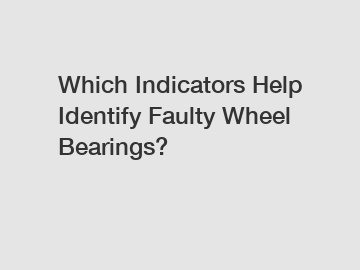Which Indicators Help Identify Faulty Wheel Bearings?
Which Indicators Help Identify Faulty Wheel Bearings?
Your vehicle's wheel bearings play a crucial role in ensuring a smooth and safe driving experience. These small but mighty components allow the wheels to rotate smoothly while supporting the weight of the vehicle. Over time, wheel bearings may wear out or become damaged, leading to potential safety hazards on the road. Knowing how to identify faulty wheel bearings can help you address the issue promptly and prevent further damage. In this article, we will discuss the primary indicators that can help you determine if your wheel bearings need attention.
Unusual Noise.

One of the primary signs of a faulty wheel bearing is unusual noise coming from the affected wheel. A constant grinding or growling sound, especially when you are driving at a certain speed or taking turns, often indicates worn-out bearings. This noise is typically caused by the lack of lubrication or the accumulation of debris inside the bearing, leading to friction and damage. If you hear these noises, it is crucial to have your wheel bearings inspected and replaced promptly.
Uneven Tire Wear.
Faulty wheel bearings can also result in uneven tire wear. Keep an eye on your tires and check for signs of abnormal wear patterns. If you notice that the tire tread on a specific wheel is wearing faster than the others, it may indicate a problem with the corresponding wheel bearing. When the bearing is not functioning correctly, it can cause the tire to wobble or tilt, leading to uneven tire wear. Addressing the issue promptly can help prolong the life of your tires and ensure safer driving.
Vehicle Pulling.
If the wheel bearing on one side of your vehicle is damaged, you may experience pulling or drifting to the affected side. A faulty bearing can cause friction or misalignment, which results in an imbalanced distribution of weight. As a result, you may notice that your vehicle pulls to one side, especially when you are driving in a straight line. This can be dangerous, as it can affect your control over the vehicle. If you observe any pulling, it is essential to have your wheel bearings inspected by a professional mechanic.
Excessive Vibrations.
When wheel bearings are worn out or damaged, they can create excessive vibrations throughout your vehicle. These vibrations can be felt in the steering wheel, floorboard, or even the seats. If you notice unusual vibrations, especially at higher speeds, it may indicate a problem with your wheel bearings. It is crucial to address this issue promptly to prevent further damage and ensure a comfortable and safe driving experience.
Conclusion.
Identifying faulty wheel bearings is crucial for maintaining the safety and performance of your vehicle. By paying attention to the indicators discussed above – unusual noise, uneven tire wear, vehicle pulling, and excessive vibrations – you can detect potential problems early on and take the necessary steps to address them. If you suspect that your wheel bearings may be faulty, it is always recommended to consult with a professional mechanic for a thorough inspection and, if necessary, replacement. Don't ignore any signs of wheel bearing issues, as prompt action can prevent more extensive and costlier damage down the road. If you have any questions or would like to schedule a wheel bearing inspection, please do not hesitate to contact us.
The company is the world’s best deep groove ball bearing advantages, shaft cross, cross joint function supplier. We are your one-stop shop for all needs. Our staff are highly-specialized and will help you find the product you need.

Comments